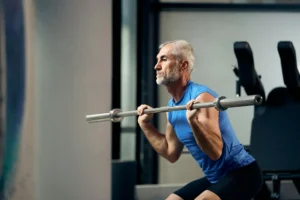A lot of times I have discussions with patients regarding who’s an ideal candidate for something like a platelet-rich plasma or PRP injection. In general, terms, when it comes to the shoulder, there are a few conditions that have responded favorably in the literature to the use of PRP. Those include partial-thickness rotator cuff tears, calcific tendonitis, adhesive capsulitis, and early glenohumeral or shoulder arthritis.
One thing to be very careful of is making sure that the treatment is being applied to an indicated diagnosis or to the right problem. It’s not uncommon for people to have horror stories or bad experiences where a friend or a neighbor, or maybe themselves were seen and treated by another provider, another clinician, and underwent PRP injections, and didn’t have a good outcome. And sometimes, that’s because it wasn’t indicated in the first place. That’s a discussion that we have together as we evaluate your MRI and determine whether this is a partial thickness or a full-thickness rotator cuff tear because that makes a difference in whether you’d be a candidate for PRP injections. Then we can proceed down that path if you choose to go down that as a viable treatment option for your problem.
In general terms, after a PRP injection, there’s not a lot of quote-unquote restrictions. Patients are going to want to try to avoid any real aggressive activity for the first few days just to give that area a chance to rest and recover from the injection itself. You’re going to want to make sure that from a medication standpoint, we want to avoid certain things like anti-inflammatories, steroids, other things that can interfere with the body’s natural healing process. We want the immune system of our body to be aggressive and active and use those properties to help heal the problem.
From there, hope that things improve and you’re able to make a successful progress in your recovery.
One of the common conditions that we see in the office as a shoulder surgeon is adhesive capsulitis or frozen shoulder. And I get asked the question, does PRP help or benefit a frozen shoulder? The short answer is yes. In a typical scenario, we use cortisone injections, physical therapy, and other conservative measures to really address the problem, which is an inherent inflammation of the capsule that surrounds the joint.
Over time, literature has shown that adhesive capsulitis will typically resolve on its own, but it can be quite prolonged. So most of the treatment methods that we employed are designed to shorten that window and take something that can take years to improve on its own and shrink it down to a few months. The thought behind PRP is that it’s some of your body’s natural healing properties. And if we can use that too and inject that inside of the joint, it can help decrease the inflammation that the capsule is experiencing and help to eliminate or alleviate pain and allow for a faster resolution of the symptoms.
When using PRP to treat conditions of the shoulder, typically, we use a series of two injections. They’re spaced out by about a month between. There’s time for the first injection to work and begin the process of healing soft tissues before we add the second dose in. And that way, we can maximize the amount of healing properties that we introduce to that partial-thickness rotator cuff tear, or a calcific tendonitis, or frozen shoulder, or whatever the case may be to maximize the anti-inflammatory benefits of the joint and maximize your likelihood of having a positive outcome.
If you feel that you would be a candidate for PRP injections, or you have more questions, please feel free to call and schedule a consultation with me in my office. I’d love to go over your imaging studies and have a conversation with you regarding PRP and whether or not it would be effective in helping you treat your medical condition. And I look forward to seeing you in our office.





